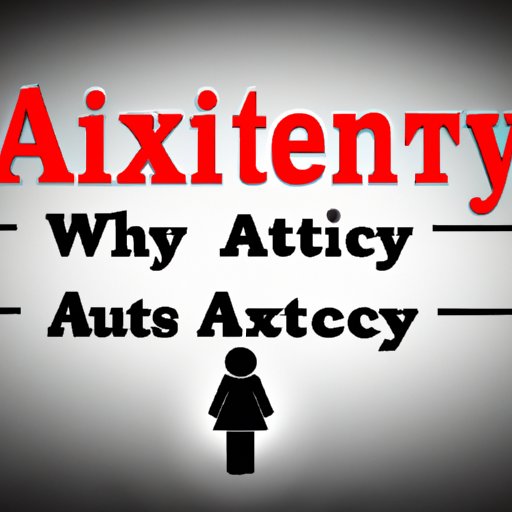
Introduction
It’s no secret that anxiety can wreak havoc on the body and mind, and it’s not uncommon for weight loss to be one of the signs of anxiety. However, the relationship between anxiety and weight loss is more complex than many people realize. In this article, we’ll explore that relationship in-depth, from the ways anxiety affects the body to the unintended consequences of anxiety-related weight loss.
The Complex Relationship Between Anxiety and Weight Loss
Anxiety, in its most basic definition, is a feeling of worry, nervousness, or unease about something with an uncertain outcome. When we experience anxiety, our bodies respond with a cascade of physiological changes that prepare us for either “fight or flight.” While this response can be beneficial in some situations, chronic anxiety can have a damaging effect on the body.
One of the ways anxiety affects the body is through the digestive system. The release of stress hormones like cortisol and adrenaline can cause a decrease in appetite and slow down digestion. As a result, some people may experience unintended weight loss as a symptom of their anxiety.
Unintended Consequences: How Anxiety and Weight Loss Impact Physical and Mental Health
While weight loss may be desirable for some individuals, rapid, unintentional weight loss can harm physical and mental health. Losing too much weight too quickly can weaken the immune system, leading to an increased risk of infection and illness. Additionally, anxiety-related weight loss may exacerbate preexisting health conditions, such as diabetes or heart disease.
Anxiety-related weight loss can also have a negative impact on mental health. Some people who experience rapid weight loss may struggle with body dysmorphia or develop eating disorders like anorexia or bulimia. These disorders can be difficult to overcome and may require professional intervention.
Can Anxiety Be a Good Thing for Weight Loss? Examining the Science Behind the Myth
There is a myth that anxiety can be a useful tool for weight loss, but there is little scientific evidence to support this idea. While stress hormones like cortisol can increase metabolism in the short term, the long-term effects of anxiety-related weight loss are far from beneficial.
The truth is that anxiety should never be used as a tool for weight loss. Instead, individuals should focus on healthy ways to lose weight, such as eating a balanced diet and participating in regular exercise. Weight loss should not be the goal of anxiety management, but rather a byproduct of healthy habits.
The Dangers of Using Anxiety As a Weight Loss Tool
The dangers of using anxiety as a weight loss tool are significant. The physical risks of rapid weight loss have already been discussed, but the mental health risks are equally concerning. Using anxiety as a weight loss tool can lead to the development of eating disorders, which can have serious long-term consequences.
Individuals who struggle with anxiety and weight loss should seek professional help to manage their symptoms, rather than attempting to use anxiety as a weight loss tool on their own.
Exploring the Emotional Triggers Behind Anxiety-Related Weight Loss
For some individuals, anxiety-related weight loss may be triggered by emotional issues like stress, trauma, or even grief. Identifying these triggers is a crucial step in managing anxiety-related weight loss, as it enables individuals to address the root cause of their symptoms.
There are many ways to identify personal emotional triggers, including therapy, journaling, and introspection. Once identified, the triggers can be addressed with healthy coping mechanisms like counseling, meditation, or exercise.
Find Balance: Managing Anxiety Without Sacrificing Your Health and Wellness Goals
For individuals who struggle with anxiety-related weight loss, finding balance is key. This often means managing anxiety in healthy ways while setting and achieving realistic health and wellness goals.
Some suggestions for managing anxiety in healthy ways include practicing mindfulness, scheduling time for self-care, and surrounding oneself with a support system. Building a support system is crucial, as it provides individuals with the encouragement and accountability they need to stay on track.
Conclusion
While anxiety-related weight loss can be a concerning symptom, it is essential to remember that weight loss should never be the goal of anxiety management. Rather, individuals should focus on healthy ways to manage their anxiety while prioritizing their overall health and wellness goals. With professional help and healthy coping mechanisms, individuals can find balance and lead fulfilling lives.
If you are struggling with anxiety-related weight loss, consider seeking the help of a mental health professional. With the right tools and support, you can manage your symptoms and achieve your health and wellness goals.





